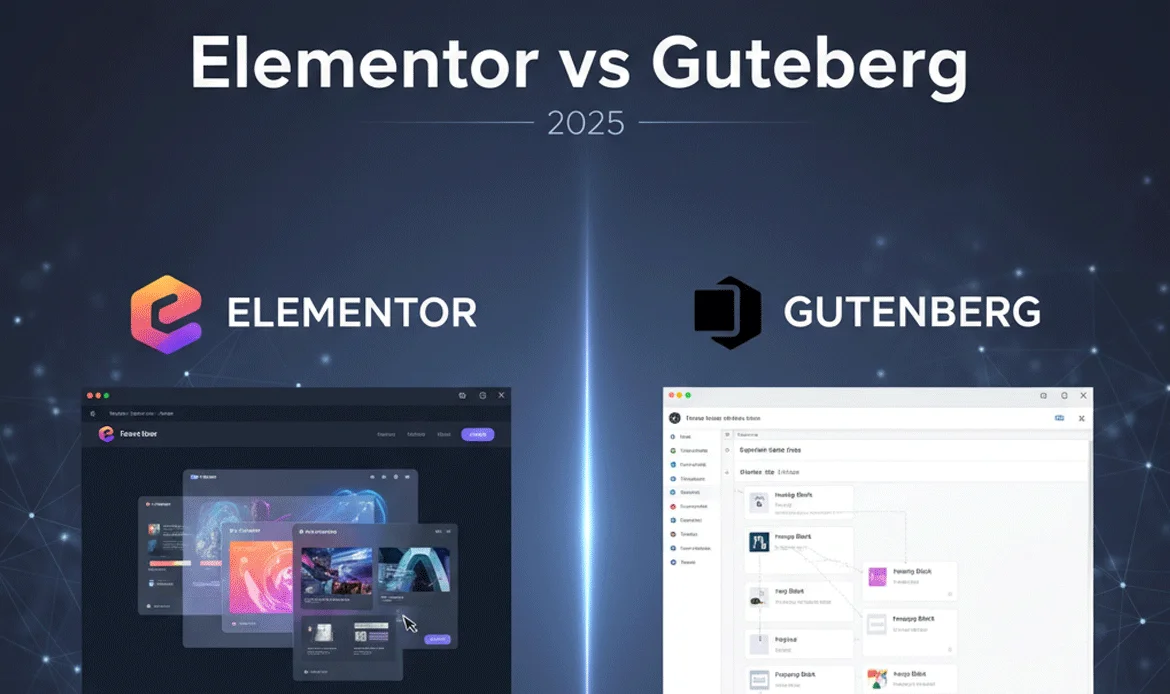Choosing between Elementor vs Gutenberg has become one of the biggest decisions for anyone building a WordPress website in 2025. Both editors offer unique strengths in design, performance, and workflow—but selecting the right one can directly impact the user experience, SEO results, and even your ability to speed up WordPress site performance. With more businesses prioritizing website speed, customization flexibility, and scalability, understanding how these two editors differ can help you make a smarter and future-proof decision for your brand.
1. Visual Editing Experience and Flexibility
The visual editing experience plays a crucial role in how efficiently creators build pages, and the flexibility offered by different editors directly impacts design quality. Elementor provides an advanced drag-and-drop interface with real-time editing, allowing users to control every aspect of layout, typography, spacing, and animation with ease. In contrast, Gutenberg uses a streamlined block-based structure that keeps the editing environment clean, fast, and efficient.
Key Points- Drag-and-drop flexibility for complex layouts
- Gutenberg’s block editor is faster and cleaner
- Elementor ideal for designers and agencies
- Gutenberg ideal for bloggers and minimal websites
- Both integrate well with modern themes
2. Performance and Speed Optimization
Performance remains one of the biggest deciding factors when choosing a WordPress editor, and the overall speed of your website depends heavily on the amount of code an editor generates. Gutenberg is lightweight, fast, and loads fewer resources, making it highly efficient for websites focused on Core Web Vitals and SEO performance. Elementor, while feature-rich, adds additional scripts and styling layers that may require extra optimization to achieve top-tier speed scores. With proper caching, minification, and hosting, Elementor can still deliver excellent performance, but Gutenberg naturally provides a faster baseline due to its native integration with WordPress core.
Key Points- Gutenberg loads fewer scripts
- Elementor requires optimization plugins
- Lightweight blocks improve loading time
- Site speed impacts SEO and conversions
- Gutenberg is better for minimal builds
3. SEO Capabilities and Structure
SEO performance is deeply influenced by the structure of your content and the technical output of your chosen page builder. Gutenberg’s clean HTML structure, efficient block rendering, and minimal dependencies give it a natural advantage for SEO-friendly architecture. Elementor offers strong SEO capabilities too, especially when combined with plugins like Yoast or RankMath, but its more complex DOM structure may require additional optimization.
Key Points- Gutenberg improves core web vitals
- Elementor provides more user-friendly design tools
- Both are compatible with Yoast and RankMath
- Clean HTML structure benefits SEO
- Gutenberg ideal for SEO-focused websites
4. Design Control and Customization Options
Elementor leads in design control, offering an extensive library of widgets, templates, animations, and custom styling features that allow full creative flexibility. It gives designers the freedom to craft unique visual experiences without writing custom code. Gutenberg, on the other hand, focuses on simplicity and maintains a more structured approach, allowing customization through blocks, patterns, and full site editing.
Key Points- Elementor offers advanced templates
- Gutenberg ensures clean and consistent layouts
- Elementor Pro unlocks deeper styling features
- Gutenberg FSE improves theme customization
- Elementor is ideal for creative professionals
5. Theme Compatibility and Full Site Editing
Theme compatibility plays a major role in how smoothly your editor integrates with the rest of your website. Gutenberg works seamlessly with modern block themes and supports full site editing (FSE), allowing users to modify headers, footers, templates, and global styles directly from the editor. Elementor requires an Elementor-friendly theme to unlock its full potential but offers greater layout freedom once properly configured.
Key Points- Gutenberg works seamlessly with block themes
- Elementor requires optimized themes
- FSE adds modern site-wide control
- More block themes available in 2025
- Gutenberg reduces plugin reliance
- Elementor has more add-ons
- Gutenberg’s blocks increasing quickly
- Both work with WooCommerce
- Gutenberg blocks load faster
- Elementor ecosystem supports advanced design
- Elementor ideal for non-technical users
- Gutenberg ideal for writers and minimalists
- Elementor interface is more intuitive
- Gutenberg offers a cleaner workflow
- Gutenberg reduces dependency on plugins
- Gutenberg is 100% free
- Elementor Pro offers premium features
- Elementor suits professional creatives
- Gutenberg provides long-term cost savings
- Both offer high value depending on the project
- Gutenberg loads faster at scale
- Elementor ideal for landing pages
- Gutenberg supports enterprise-level performance
- Elementor requires strong hosting
- Gutenberg fits high-traffic publications
- Gutenberg produces cleaner mobile layouts
- Elementor requires optimization
- Gutenberg improves page performance
- Elementor offers device-level editing
- Mobile speed directly affects SEO
6. Plugin Integration and Ecosystem Support
Both Elementor and Gutenberg are well-supported within the WordPress ecosystem, but they cater to different user needs. Elementor benefits from a large third-party marketplace filled with premium add-ons, widgets, and advanced extensions, giving developers endless customization options. Gutenberg’s block ecosystem is growing rapidly as more plugin developers adopt block-based architecture, offering lightweight and performance-focused enhancements.
Key Points7. User Learning Curve and Ease of Use
Ease of use is often a deciding factor for beginners and professionals alike. Elementor provides a highly intuitive interface that is easy to understand, making it perfect for users who want a visual, drag-and-drop workflow. Gutenberg has a simpler, more structured environment but may feel limited for users accustomed to advanced page builders. However, its minimal interface reduces distractions and speeds up the content creation process. Gutenberg also integrates naturally with WordPress, making it easier to learn over time.
Key Points8. Cost, Budget, and Long-Term Value
Budget considerations are essential when choosing between Elementor and Gutenberg. Gutenberg is entirely free and built into WordPress, making it extremely cost-effective for users seeking performance without added expenses. Elementor offers a free version, but the most advanced features require a Pro subscription. While Elementor Pro delivers exceptional design capabilities, the cost adds up over time, especially for agencies managing multiple websites.
Key Points9. Scalability for Large Projects
Scalability determines how well a website performs as it grows in content, traffic, and design complexity. Gutenberg’s lightweight structure makes it ideal for large-scale websites, high-traffic blogs, and enterprise platforms that demand speed and stability. Elementor can handle large websites as well, but its heavier output may require stronger hosting, more caching, and precise optimization. Gutenberg keeps things simple, ensuring smooth performance as the website expands. Elementor offers deep customization but must be managed carefully to maintain long-term scalability.
Key Points10. Mobile Responsiveness and Page Speed
Mobile responsiveness and page speed are crucial ranking factors, and both editors offer tools to optimize mobile layouts. Gutenberg produces naturally clean mobile-friendly pages with minimal rendering issues. Elementor allows users to customize mobile, tablet, and desktop layouts separately, giving full control over spacing, typography, and visibility. While Elementor’s features are powerful, they can increase page size if not carefully optimized.
Key PointsFrequently Asked Questions (FAQ)
✔ Which editor is better for beginners?
Elementor is more beginner-friendly due to its visual interface, while Gutenberg is better for simplicity and content-focused users.
✔ Which editor is faster for performance?
Gutenberg is faster because it loads fewer scripts and is part of WordPress core.
✔ Can both editors be used together?
Yes, you can use Gutenberg for posts and Elementor for pages, but performance must be monitored.
Conclusion
In 2025, the choice between Elementor vs Gutenberg depends heavily on your website goals. Elementor excels in creative freedom, interactive layouts, and professional designs, while Gutenberg leads in speed, performance efficiency, and long-term scalability. If you want complete visual control, Elementor is the perfect match. But if you want lightweight performance and the ability to naturally speed up WordPress site functions, Gutenberg clearly wins. Both are powerful—your final decision should depend on design needs, budget, and performance priorities.
Get the Perfect WordPress Theme for Your Next Project
Choosing the right page builder becomes even more powerful when paired with a high-quality, performance-optimized WordPress theme. Our premium themes are built with clean code, lightning-fast loading speed, and full compatibility with both Elementor vs Gutenberg, ensuring a smooth workflow no matter which editor you prefer.












